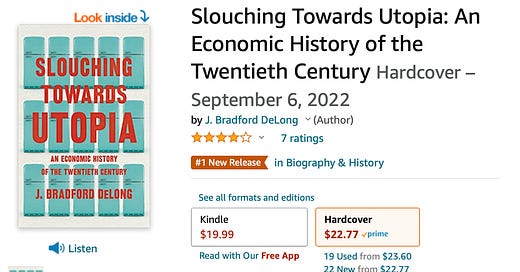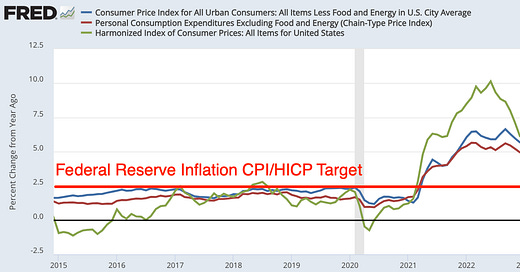
Our Ancestors Thought We'd Build an Economic Paradise. Instead We Got 2022, &
BRIEFLY NOTED: For September 12, 2022
I greatly enjoy and am, in fact, driven to write Grasping Reality—but its long-term viability and quality do depend on voluntary subscriptions from paying supporters. I am incredibly grateful that the great bulk of it goes out for free to what is now well over ten-thousand subscribers around the world. If you are enjoying the newsletter enough to wish to join the group receiving it regularly, please press the button to sign up for a free subscription and get (the bulk of) it in your email inbox. And if you are enjoying the newsletter enough to wish to join the group of supporters, please press the button and sign up for a paid subscription:
FIRST: Our Ancestors Thought We'd Build an Economic Paradise. Instead We Got 2022
I have a 3000-word precis of the argument of Slouching Towards Utopia <bit.ly/3pP3Krk> in Time this week. If you don’t want to read the book—but still want to be able to speak with authority about what the book says—go read it!
Time :: September 8, 2022 10:52 AM EDT <https://time.com/6211380/economic-prosperity-failed/>
Human history before 1870 was generally awful. But after 1870 we began to wriggle out from the traps that we were then in. So most people back then would, had they been able to foresee our immense technological power and sophistication, have expected us to have built our world that we live in today into a paradise, a utopia.
We manifestly have not.
What went wrong?
Back before 1870 the human population was always too large relative to our low (and slowly improving) level of technology, and our limited ability to harvest natural resources. Why? Because poverty made infant mortality very high, and patriarchy meant that women’s durable social power (with a few exceptions) came pretty much only from being mothers of surviving sons…
One Video:
DW Documentary: The World of China’s President Xi Jinping:
One Image: Now on Sale!
Very Briefly Noted:
Sophie Roell: Nonfiction of 2022: Fall Roundup: 'Some notable new nonfiction books published since June.... Slouching Towards Utopia: An Economic History of the Twentieth Century by Brad DeLong...
Daily Culture Picks: Slouching Towards Utopia: ‘: Brad DeLong on why the years from 1870 to 2010 were humanity’s most important…
Aspen Security Forum: Weakly Leaf”: ‘Book of the week… Slouching Towards Utopia: An Economic History of the Twentieth Century…
Alex Shephard: Peter Thiel’s Handpicked Candidates Are Train Wrecks: ‘The tech billionaire wants to remake the Republican Party—and America. But Blake Masters and J.D. Vance are lagging in the polls, and struggling to raise money…
Tim Duy: Fed Watch, 9/12/22: ‘The Fed is on track to raise rates 75bp next week, with more to follow. Simply put, now that we are past peak recession fears, the inflation data remains too little and too tenuous for the more hawkish part of the Fed, which includes the all-important Board members, to step back to 50bp. This week’s inflation data won’t play into next week’s FOMC decision. Watch it instead for clues about the future path, particularly the December meeting and beyond…
Philip Maldari: Sunday Show: September 11, 2022 “Slouching Towards Utopia" and "Low Income Housing for $135,000/Year
Jan Lodal: The Part of the Espionage Act That Matters: ‘Subparagraph (d)… makes a straightforward action a crime: namely, failing to return classified documents if properly directed to give them back. No proof of the level of classification, or the intentions of the document holder, or the content of the documents, is required…
Joseph E. Stiglitz and Dean Baker: The Fed Should Wait and See: ‘With recent data showing that both inflation and inflation expectations have eased, it would be irresponsible for the US Federal Reserve to create much higher unemployment. Amid so much uncertainty, it should instead pause interest-rate hikes until a more reliable assessment of macroeconomic conditions is possible…
Social Studies: A Brief History
Cory Doctorow: Pluralistic: Spotify Is a Ripoff, a Spotify Exclusive: ‘Spotify steals from artists, a Spotify exclusive: More Chokepoint Capitalism stunt-publishing…
J. Bradford DeLong and Lawrence H. Summers: The ‘New Economy’: Background, Historical Perspective, Questions, and Speculations <https://core.ac.uk/download/pdf/6793328.pdf?utm_source=substack&utm_medium=email>
Jeff Herf: Reactionary Modernism: Technology, Culture, and Politics in Weimar and the Third Reich
Stefan Link: Forging Global Fordism: Nazi Germany, Soviet Russia, and the Contest over the Industrial Order
Glory Liu: Adam Smith’s America: How a Scottish Philosopher Became an Icon of American Capitalism
¶s:
Noah Smith: Liberalism Is Resilient: ‘Ukrainian victories are sending us an important message…. There is a clear difference between acting tough and actually being tough. The former is all about outward fierceness and savagery, while the latter is about the inner ability to endure hardship and pain and fear and still keep fighting effectively. In fact, this difference is a reason why authoritarian, illiberal regimes traditionally underestimate more liberal ones. The Nazis… Imperial Japan… the Confederacy…. The rhetoric of Putin and his cronies regarding the West’s supposed weakness echoes those earlier allegations. So does the rhetoric of Xi Jinping and his cronies in China…. What we instinctively mean when we say “liberal” and “illiberal”…. A lot of it is simply about conquerors vs. defenders. There’s a clear difference between the vision of a world where “the strong do what they can, and the weak suffer what they must”, and the vision of a world where every country is free to determine its own destiny…. Ukraine’s successes have sent us messages about what’s worth fighting for. But they have also sent us a message about how to most effectively prosecute that fight…
Giles Wilkes: ‘In 2001, two extremely bright people, DeLong and Summers, , wrote this very readable piece <https://t.co/4UH99VyAbM>_found via Ryan Avent. But it contained two wrong forecasts: that new tech would struggle to gain monopoly rents, and its economic weight would grow. Fascinating. I would never have foreseen the first. Lina Khan's piece was 16 years away. Nor the second. The point about economic salience is well put—I have really struggled to articulate this insight about rapidly declining costs and weight in GDP. Since Moore's Law HASN'T stopped, by implication the marginal usefulness of computers etc has diminished. Maybe this is right! Our first uses were emailing important documents, our last were giant server farms to host 30 second viral videos of kids lip-synching…


















I very much like this paragraph
------
My diagnosis is that, at least in the Global North, potential voters are, today: (a) profoundly unhappy with a neoliberal world in which the only rights that people have that are worth anything are their property-ownership rights and they are thus the playthings of economic forces that value and devalue their property; but (b) are anxiously unsatisfied with social democracy that gives equal shares of access to valuable things to those whom they regard as “undeserving”; and (c) while that economic anxiety can be assuaged by rapid and broad-based growth, it is also (d) stoked by those who like the current highly unequal distribution of wealth and thus seek to make politics about the discovery of (external and internal) enemies rather than about equitable prosperity.
------
A good summary of the situation, and why it's so difficult to construct a better politics. I think that puts the items in the correct order; the people stoking fears for political and financial gain are important, but they wouldn't be as successful as they are if there wasn't an existing discomfort with social democracy.
Mulling it over, I ended up re-reading this older piece by you which is also good: https://www.bradford-delong.com/2021/02/hoisted-from-%C3%BEe-archives-regional-distributional-policy-in-a-world-where-people-want-to-ignore-%C3%BEe-va.html
-----
Yet to keep the fiction that we are all fairly playing the reciprocal game of gift exchange in a 7.4 billion-strong social network—that we are neither cheaters nor saps—we need to ignore that we are coupon clippers living off of our societal inheritance.
And to do this, we need to do more than (a) set up a framework for the production of stuff, (b) set up a framework for the distribution of stuff, and so (c) create a very dense reciprocal network of interdependencies to create and reinforce our belief that we are all one society.
We need to do so in such a way that people do not see themselves, are not seen as saps—people who are systematically and persistently taken advantage of by others in their societal and market gift-exchange relationships. We need to do so in such a way that people do not see themselves, are not seen as, and are not moochers—people who systematically persistently take advantage of others in their societal and market gift-exchange relationships. We need to do this in the presence of a vast increasing-returns in the knowledge- and network-based societal dividend and in spite of the low societal marginal product of any one of us.
Thus we need to do this via clever redistribution rather than via explicit wage supplements or basic incomes or social insurance that robs people of the illusion that what they receive is what they have earned and what they are worth through their work.
Now I think it is an open question whether it is harder to do the job via predistribution, or to do the job via changing human perceptions
------